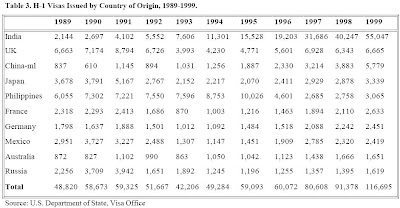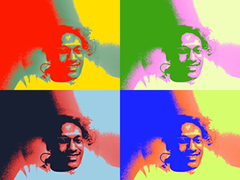As some of my friends get ready to file their H1Bs this summer, the USCIS expects the same or nearly same amount of petitions filed as last year. There were around 150,000 petitions, around 2 times the cap number : 65,000 (which is the number that they started with when I was 8 years old. I'm 24 now. Briefly, they increased it to 115,000 in 2000. But it reverted back to 65,000 in 2002.) in only 2 days and USCIS had to rapidly shutdown accepting applications to stop getting flooded with petitions. They are expecting a similar amount of petitions this year too.
Here are the caps as far as they mention in their site:
Here are the caps as far as they mention in their site:
- Reg. Cap (65,000 regular cap cases minus the C/S cap cases received)
- C/S Cap (Chile/Singapore H-1B1s)
- U.S. Masters (20,000 cap exemption for beneficiaries with U.S. Masters or higher degrees)
- Exempt (for petitions filed by certain institutions of higher education; nonprofit organizations; and nonprofit research organizations or governmental research organizations, as defined in USCIS regulations)
(source: U.S Citizenship and Immigration Services)
Many of my friends who joined companies last year would be in that 20,000 cap exemption for benificiaries with U.S Masters or higher degrees. Some of my fellow academics who join research labs or universities would be Exempt. The other reality and truth of the situation is when you throw in the several thousand off-shore companies shipping their employees on H1 and L1 visas for temporary periods you have a rush to file petitions and hence the 150,000 in 2 days issue.
There have been stark changes in the jobs among the H1-population , as this publication for the CCIS(Center for Comparative Immigration Studies) points out :
In 1989, Healthcare jobs were the top H1 jobs, in 10 years time it was nowhere in the race. In 1999, IT/Computers/High Tech. fields topped the list with almost 60% of the H1 jobs in the IT industry. Click on the pictures and see for yourself.
Many of my friends who joined companies last year would be in that 20,000 cap exemption for benificiaries with U.S Masters or higher degrees. Some of my fellow academics who join research labs or universities would be Exempt. The other reality and truth of the situation is when you throw in the several thousand off-shore companies shipping their employees on H1 and L1 visas for temporary periods you have a rush to file petitions and hence the 150,000 in 2 days issue.
There have been stark changes in the jobs among the H1-population , as this publication for the CCIS(Center for Comparative Immigration Studies) points out :
In 1989, Healthcare jobs were the top H1 jobs, in 10 years time it was nowhere in the race. In 1999, IT/Computers/High Tech. fields topped the list with almost 60% of the H1 jobs in the IT industry. Click on the pictures and see for yourself.
1989, Job Numbers 1999, Job Numbers
In 1989, The highest number of H1 workers were from the UK and Phillipines. But they were at around 12-14% each, of the whole H1 Population. India was around 4%.
In 1999, UK and Philippines hadn't seen much growth in the H1 numbers and represented 5% and 2% respectively. While, India's numbers show a gargantuan change: 55, 047 / 119,000 odd. Almost 50% of the H1 job population. Even as China's numbers have grown, their share in this has not.
In 1999, UK and Philippines hadn't seen much growth in the H1 numbers and represented 5% and 2% respectively. While, India's numbers show a gargantuan change: 55, 047 / 119,000 odd. Almost 50% of the H1 job population. Even as China's numbers have grown, their share in this has not.
H1 Numbers: By Country
So, its more of an Indian thing now, with 50% of the H1 population in 1999 being Indians. I don't know about current (2007) numbers. Need to dig up more information. As "the senator from Punjab" as Barack Obama called her, says the government surely needs to think about increasing the cap. This was during the H1B visa debate which raged around June 2007. It started with this video. Went along with this one, was kept aflame with this one and people like Wogsland also argued against the cap in this video for example.
I feel there should be an increase in the cap, even if it is slight. Probably around 120, 000 in all instead of the 88,000 in all limit. This will keep people working in America whoever they are wherever they're from as long as they are a benefit to the US economy. Otherwise, this will prompt companies to find other reasons like for example: Microsoft has centers in Israel, Denmark,Canada to counter the effects of the immigration cap. More companies will outsource jobs. Talented students will try to find jobs in companies based in other countries. Eventually, USA will not be the only country where world class IT jobs are sought in. Already, Singapore / Hong Kong, Japan are serious contenders. Throw in a resurgent Europe and Asia into the mix, we've got a worldwide job market.
I feel there should be an increase in the cap, even if it is slight. Probably around 120, 000 in all instead of the 88,000 in all limit. This will keep people working in America whoever they are wherever they're from as long as they are a benefit to the US economy. Otherwise, this will prompt companies to find other reasons like for example: Microsoft has centers in Israel, Denmark,Canada to counter the effects of the immigration cap. More companies will outsource jobs. Talented students will try to find jobs in companies based in other countries. Eventually, USA will not be the only country where world class IT jobs are sought in. Already, Singapore / Hong Kong, Japan are serious contenders. Throw in a resurgent Europe and Asia into the mix, we've got a worldwide job market.
So, if you consider the now existing cap of 65,000 + 20,000 (Maters workers) which has in fact decreased from the cap in 1999 back to the 1991 limit in 2002 and the number of international students studying in the US (around 550,000 odd) out of which atleast 10% or around 10% are applying for a H1B visa when they complete their education, its "almost unfair" to say that "A typical High tech American graduate" is denied jobs to accommodate the ones who are equally suited for the job. Out of a 150,000 applications that comes in at the rate of 100,000 per day for an average of 88,000 odd "non-immigrant" work visas, nearly 70,000 applicants (most applicants have already secured the job in a company after several rounds of interviews) are denied visas by a random lottery.
Is this the price they want to pay for the hard work? The hard time they went through writing effective linked lists, binary trees and hash tables... preparing hard for the interviews, getting through the process and then their life being decided by a lottery? Pure luck?
But, there's another side to the story too, which needs more research before I discuss it here.
The other reason I wrote this blog is that I came across another list:
The Number of H1B petitions approved breakdown by company .. I was surprised to find that among all universities in the US, there were more H1B petitions from the University of Illinois at Chicago in 2007 than any other univ. which is my university as a matter of fact. It has moved from rank 31 in 2006 to rank 18 in 2007. The "not-so-surprising" facts are clear to see, look at the number of Indian companies in the list.
But, there's another side to the story too, which needs more research before I discuss it here.
The other reason I wrote this blog is that I came across another list:
The Number of H1B petitions approved breakdown by company .. I was surprised to find that among all universities in the US, there were more H1B petitions from the University of Illinois at Chicago in 2007 than any other univ. which is my university as a matter of fact. It has moved from rank 31 in 2006 to rank 18 in 2007. The "not-so-surprising" facts are clear to see, look at the number of Indian companies in the list.
Graph: Infosys ranks number 1, *UIC ranks 18
[ The web link to the article ] Click
The PDF: http://www.computerworld.com/pdfs/editorial/h1b.pdf
and yeah.. the H1B season for 2008 will be here in 15 days.
The PDF: http://www.computerworld.com/pdfs/editorial/h1b.pdf
and yeah.. the H1B season for 2008 will be here in 15 days.






3 comments:
Hi da Arun,
It seems u have done quite a bit of research on the H1B visa! For doctors as far as i know, there are only 2 main choices. J1 , H1. I will not be eligible for J1 as i am applying from the UK. My only option is H1. My friends have told me that as long as i get a residency, i can get a visa. Some hospitals apparently get H1B visas if u need it, in others, u can negotiate for it provided u bear the solicitor fees. Many other hospitals accept only J1 (i am not applying in these places anyway). Do you know anything about this?
I think it depends upon the hospital you are given residency. Most of the hospitals will come under not-for-profit or affiliated to an institution of higher learning. So, You need not worry about the cap. You will be exempt.
I got mine today!
Post a Comment